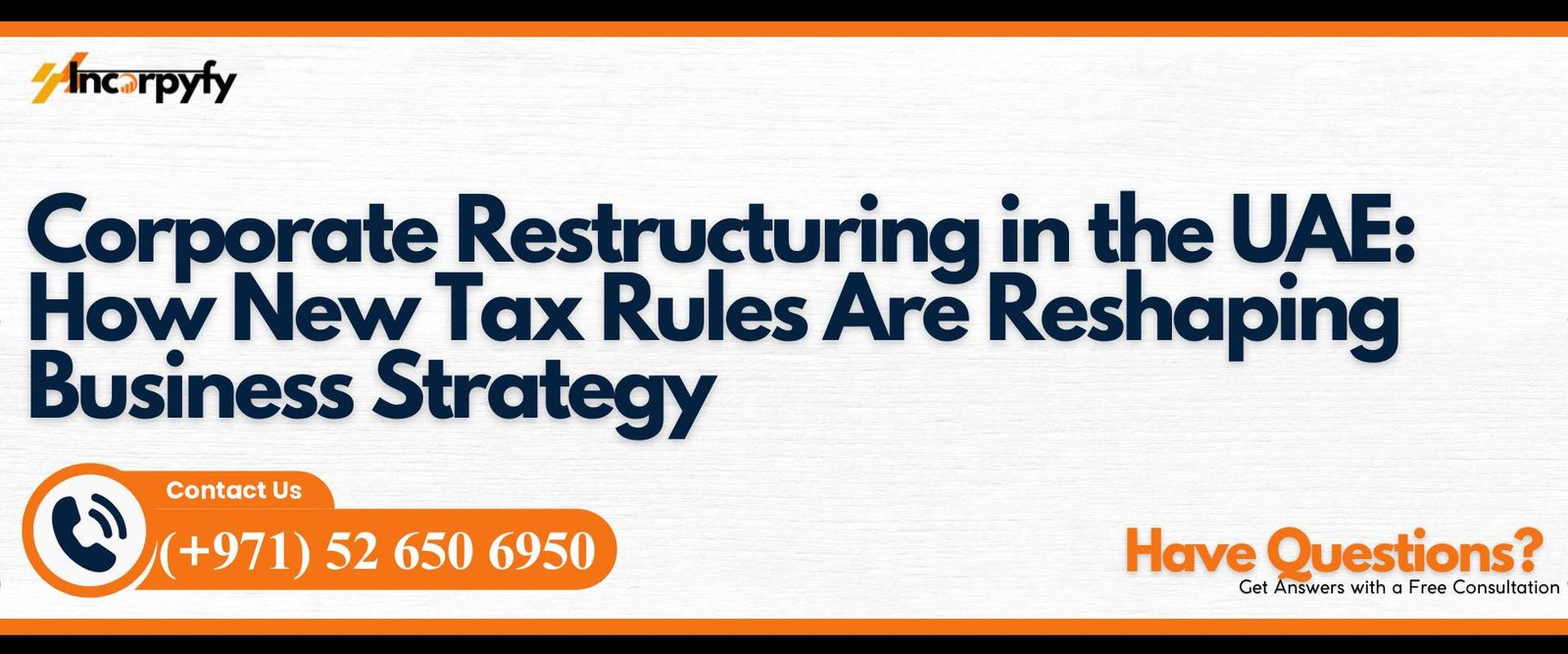
The introduction of corporate tax in the UAE has created a wave of change across businesses. What was once a tax-free haven has evolved into a regulated business environment, urging companies to rethink how they operate, merge, or expand. With new tax rules in place, corporate restructuring has become a vital strategy for staying competitive and compliant in 2025 and beyond.
What is Corporate Restructuring?
Corporate restructuring refers to the process of reorganizing a company’s legal, operational, or financial structure. The goal is often to improve tax efficiency, cut operational costs, or prepare for expansion.
In the UAE, restructuring now revolves heavily around aligning with corporate tax regulations, economic substance rules, and transfer pricing guidelines.
Why Corporate Restructuring is Gaining Importance in the UAE
The introduction of UAE Corporate Tax Law, effective from 2023, has made it critical for companies to reassess their structure. Businesses are now:
- Separating business units
- Creating holding entities
- Optimizing free zone vs mainland operations
Restructuring is no longer optional—it’s a strategic need for tax planning and risk mitigation.
Overview of the New Corporate Tax Rules in the UAE
The UAE’s new tax regime includes:
- 9% corporate tax on net profits exceeding AED 375,000
- Transfer pricing compliance based on OECD guidelines
- Economic Substance Regulations (ESR) for relevant activities
- Minimum top-up taxes for multinational groups under BEPS Pillar Two
These rules directly impact how businesses must report, allocate, and manage profits.
How Corporate Tax Rules Influence Business Structures
Corporate tax rules in the UAE push businesses to:
- Identify taxable entities vs exempt ones
- Rethink profit centers and loss-making units
- Manage intercompany transactions with accurate documentation
Many businesses are creating group structures to reduce tax liabilities, ensure substance, and improve reporting accuracy.
Key Business Models Being Restructured Under New Tax Laws
Let’s explore the major models undergoing changes due to corporate tax in UAE.
Mergers and Acquisitions in the Tax Era
Many UAE companies are:
- Merging entities to consolidate taxable profits
- Acquiring local firms to offset tax exposure
- Re-aligning ownership for tax group eligibility
M&A deals are now structured with tax impact assessments at the core.
Spin-offs and Demergers to Enhance Tax Efficiency
Companies are spinning off business units to:
- Separate taxable activities from exempt ones
- Comply with economic substance rules
- Focus on core operations
This helps optimize the taxable base and avoid unwanted exposure.
Holding Companies and IP Structures Under New Tax Regime
Establishing holding companies is a rising trend. These entities:
- Hold shares, real estate, or IP assets
- Collect dividends or royalties
- Act as parent entities to operational arms
This structure allows tax-efficient income routing and enhanced asset protection.
Transfer Pricing and Group Reorganizations
Transfer pricing is a major driver of restructuring. Companies are:
- Reviewing intercompany transactions
- Drafting master and local files
- Adjusting group service models
Proper documentation now protects against tax penalties and double taxation.
Free Zone Companies vs Mainland Companies: A Tax Perspective
While free zones offer 0% corporate tax for qualifying income, not all activities are exempt. This forces restructuring between:
- Mainland and free zone subsidiaries
- Group-wide compliance mechanisms
- Choosing the right location for new ventures
Misalignment can lead to tax leakage and compliance risks.
International Tax Compliance and UAE-Based Businesses
The UAE has committed to:
- OECD’s BEPS framework
- Global Minimum Tax rules
- Information exchange agreements
This means MNEs must rethink their international holding structures and UAE’s role within them. Corporate restructuring ensures compliance while maintaining global tax competitiveness.
Economic Substance Regulations and Their Impact on Restructuring
The Economic Substance Regulations (ESR) apply to businesses conducting:
- Banking
- Insurance
- Headquarters business
- IP business
- Lease-finance and others
To pass ESR tests, businesses are:
- Setting up local board presence
- Hiring UAE-based employees
- Building physical offices
If not feasible in a current entity, businesses restructure or relocate operations.
Legal and Regulatory Considerations for Restructuring
Corporate restructuring must also align with:
- UAE Commercial Companies Law
- Free zone authority guidelines
- MOUs between entities
Legal compliance ensures that your new structure is recognized and enforceable.
Steps to Effectively Restructure a Business in the UAE
Let’s break down the stages for a successful and tax-compliant restructuring plan:
Step 1: Conduct a Strategic Tax Impact Analysis
Start by reviewing:
- Group profitability
- Taxable income segments
- Impact of transfer pricing
Identify whether your current setup is tax-efficient or needs urgent adjustment.
Step 2: Choose the Right Legal and Operational Structure
Options include:
- Holding companies
- Operating companies
- Investment arms
- IP-holding entities
Choose based on risk profile, compliance need, and cost of operations.
Step 3: Evaluate VAT, Customs, and Excise Implications
While restructuring for corporate tax, businesses must also:
- Avoid VAT registration duplication
- Maintain supply chain documentation
- Review excise duty exposure
Neglecting indirect tax planning can create unexpected costs.
Step 4: Register New Entities and Update Licenses
Depending on the restructure:
- New licenses may be needed
- Amendments must be filed with DED, MOE, or Free Zone Authority
- Bank account and tax registrations may need updates
Delays or errors here can disrupt operations.
Step 5: Migrate Assets and Contracts Securely
Whether it’s:
- Transferring IP
- Moving inventory
- Assigning leases
Ensure legally binding assignment deeds, valuation documents, and board approvals are in place.
Risks to Avoid During Corporate Restructuring
Poorly executed restructuring can result in:
- Tax audits and penalties
- Licensing non-compliance
- Shareholder disputes
- Cash flow issues
Engaging qualified advisors reduces these risks dramatically.
Tax Audit Readiness After Restructuring
Once restructured, businesses should:
- Keep detailed board resolutions
- Maintain updated tax files
- Document transfer pricing policies
- Run internal audits before FTA inquiries
Audit readiness is now part of routine tax governance.
Benefits of Corporate Restructuring Under New Tax Laws
Done right, restructuring brings:
- Lower tax liability
- Optimized cash flow
- Stronger corporate governance
- Access to tax group benefits
- Improved investor confidence
It positions businesses to grow compliantly in the UAE’s evolving economy.
Industry-Wise Restructuring Strategies in the UAE
Different sectors are embracing restructuring in unique ways:
Tech Startups and IP Ownership Shifts
Startups are transferring software IP and platforms to UAE holding companies to:
- License globally
- Reduce tax on digital income
- Attract international investors
Family-Owned Businesses and Succession Planning
These companies are creating family offices or holding structures to:
- Avoid inheritance disputes
- Reduce tax on profit distribution
- Enable multi-generational ownership
Multinational Companies and Group Consolidations
MNCs are consolidating Middle East operations into UAE hubs for:
- Tax consolidation
- Transfer pricing management
- Easier compliance with global tax rules
Why Work with Corporate Tax Advisors and Consultants
Restructuring under the UAE tax law is technical. A good business advisor in Dubai can help you:
- Choose optimal entity structures
- Prepare tax and ESR documentation
- Coordinate licensing, banking, and operations
Without guidance, businesses risk non-compliance, penalties, or missing opportunities.
Learn More: Business Setup in Dubai, UAE
Conclusion
The UAE’s shift toward corporate taxation is not just a legal update—it’s a new era for business. Restructuring is no longer just for distressed businesses. It’s now a forward-looking tool to manage compliance, tax, and scalability.
Businesses that act early, restructure wisely, and comply fully will be the ones that thrive. Whether you’re a startup, family business, or international enterprise, now is the time to review your structure and align it with the UAE’s new tax landscape.
To restructure efficiently and legally, it’s essential to work with trusted experts in Company Formation and Business Strategy in the UAE.
FAQs
Is corporate restructuring mandatory under UAE tax law?
No, but it is often necessary to optimize tax liability, ensure compliance, and reduce risks in a tax environment.
Can free zone companies benefit from restructuring?
Yes. Especially if only part of their income qualifies for 0% tax, or if they want to establish a tax group with mainland entities.
What’s the role of Economic Substance in restructuring?
If your entity performs relevant activities, you must show adequate presence in the UAE. Restructuring may help meet ESR compliance.
Does restructuring affect VAT registration?
Yes. You may need to amend VAT TRNs, re-register, or even file for VAT deregistration if your structure changes significantly.
How long does a corporate restructuring process take in the UAE?
Typically, 4 to 12 weeks, depending on the number of entities, regulatory approvals, and licensing jurisdictions involved.






